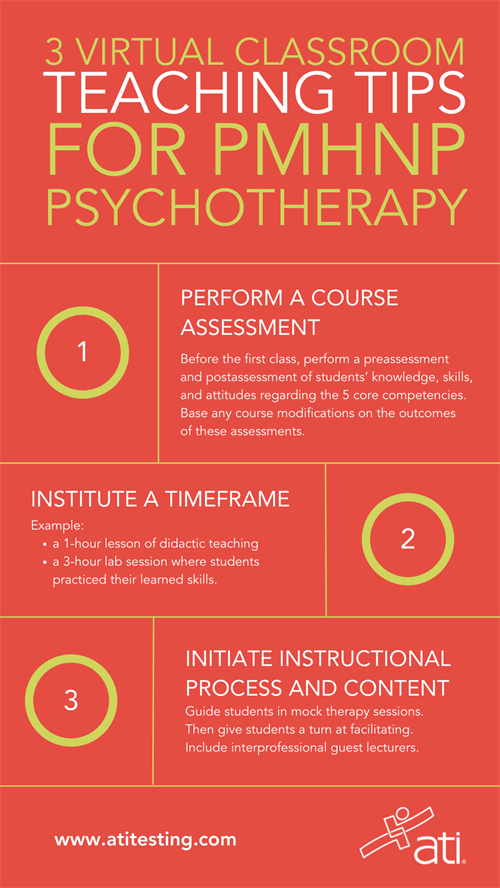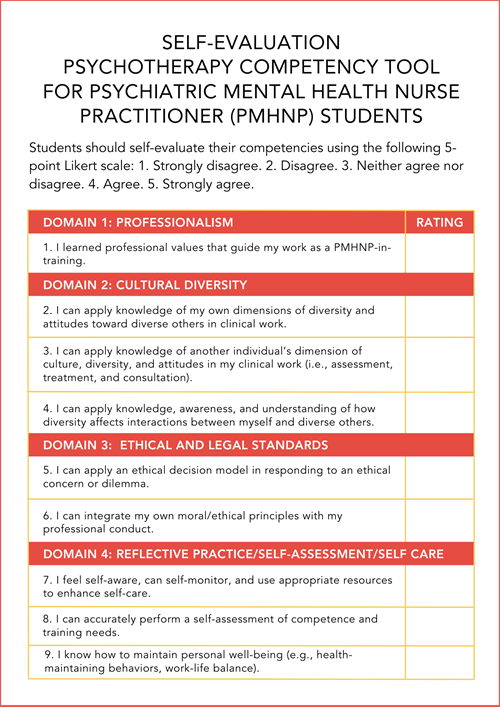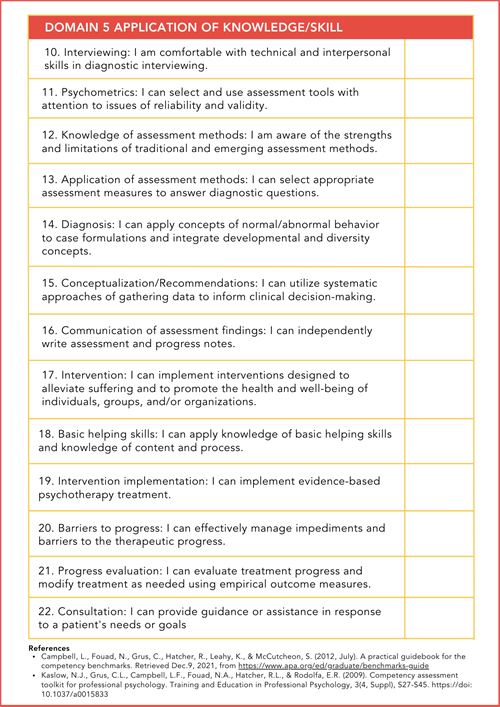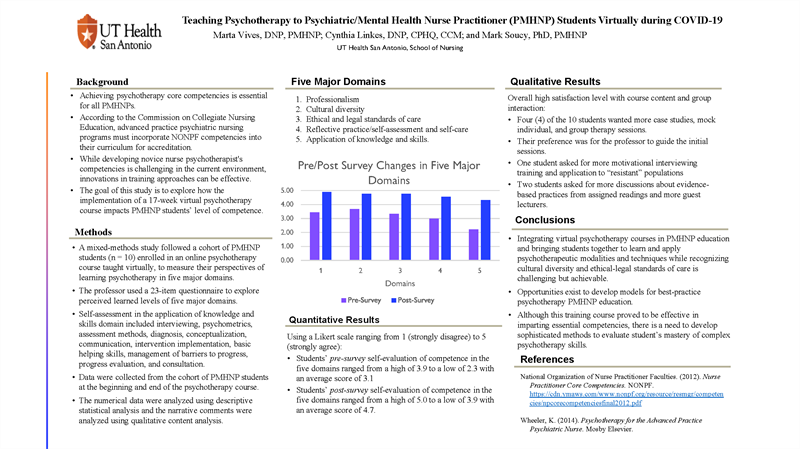HOW TO INSTILL PMHNP COMPETENCIES VIA DIGITAL PLATFORMS
3 TIPS FOR TEACHING PMHNP PSYCHOTHERAPY IN THE VIRTUAL CLASSROOM
INTRODUCTION:
 Whether you teach nursing practitioner students the 3Ps or — as in the article below — your focus is on nurse practitioner students studying psychotherapy, you can learn from recent research on teaching in the virtual classroom. While the pandemic has forced us all to get creative in the virtual world, many have wondered whether their methods are truly best practice. How can we know for sure that our efforts will be successful in developing competent, practice-ready nurse practitioners? Those questions make the research of the dedicated educators at the University of Texas Health (San Antonio) School of Nursing that much more important. Their evidence-based insights will reassure you whether you’re taking the appropriate steps toward ensuring your students’ success. As a nationally certified family nurse practitioner and a Fellow of the American Association of Nurse Practitioners, I’m always eager to discover evidence-based research to support my teaching efforts. I’ll be referring the article below to my fellow educators so they can rely on what others have already found to be successful. — Amelie Hollier, DNP, FNP-BC, FAANP, Advanced Practice Education Associates (APEA)
Whether you teach nursing practitioner students the 3Ps or — as in the article below — your focus is on nurse practitioner students studying psychotherapy, you can learn from recent research on teaching in the virtual classroom. While the pandemic has forced us all to get creative in the virtual world, many have wondered whether their methods are truly best practice. How can we know for sure that our efforts will be successful in developing competent, practice-ready nurse practitioners? Those questions make the research of the dedicated educators at the University of Texas Health (San Antonio) School of Nursing that much more important. Their evidence-based insights will reassure you whether you’re taking the appropriate steps toward ensuring your students’ success. As a nationally certified family nurse practitioner and a Fellow of the American Association of Nurse Practitioners, I’m always eager to discover evidence-based research to support my teaching efforts. I’ll be referring the article below to my fellow educators so they can rely on what others have already found to be successful. — Amelie Hollier, DNP, FNP-BC, FAANP, Advanced Practice Education Associates (APEA)By Marta Vives, DNP, RN, PMHNP; Cynthia Linkes, DNP, MSN-CNS, RN, CPHQ, CCM; and Mark Soucy, PhD, RN, APRN, FAANP
 No one who teaches psychotherapy to novice nurse psychotherapists is likely to have considered the task easy. But, when the COVID-19 pandemic hit, it became much more challenging. Helping these specialized nurse practitioner students understand the psychotherapy models and techniques they need to know is simply a lot harder when interactions are limited to the virtual classroom.
No one who teaches psychotherapy to novice nurse psychotherapists is likely to have considered the task easy. But, when the COVID-19 pandemic hit, it became much more challenging. Helping these specialized nurse practitioner students understand the psychotherapy models and techniques they need to know is simply a lot harder when interactions are limited to the virtual classroom.
Nevertheless, achieving psychotherapy core competencies is essential for all psychiatric/mental health nurse practitioners (PMHNPs).
Learn more about the growing demand for nurse practitioners.
According to the Commission on Collegiate Nursing Education (CCNE), PMHNP programs must incorporate the competencies identified by the National Organization of Nurse Practitioner Faculties (NONPF) into your curriculum to gain or maintain accreditation. Specifically, you must conduct evidence-based individual and group psychotherapies in your virtual classroom interactions so that your students acquire competencies in 5 domains:
- Professionalism
- Cultural diversity
- Ethical/Legal standards of care
- Reflective practice: self-assessment and self-care
- Application of knowledge and skills: interviewing, psychometrics, assessment methods, diagnosis, conceptualization, communication, intervention implementation, basic helping skills, management of barriers to progress, progress evaluation, and consultation.
SWITCHING FROM IN-PERSON TO ONLINE LEARNING WITH NURSE PRACTITIONER STUDENTS
Traditionally, most nurse educators have taught these core competencies to their nurse practitioner students in face-to-face settings. However, once the pandemic set in, most schools of nursing had to innovate their classroom practices and look at new ways to teach these critical skills in a virtual setting. While some programs have been able to switch back to in-person learning, at some schools, virtual classrooms continue to be commonplace.
At the University of Texas, we undertook a quality-improvement (QI) project to identify the most effective techniques for teaching psychotherapy models and techniques to our nurse practitioner students. Our faculty members found that following a specific virtual classroom structure was especially successful in elevating our PMHNP students’ level of competence.
Through the implementation and evaluation of our QI project, faculty identified the following tips for teaching psychotherapy to PMHNP students in the virtual classroom.
TIP 1: PERFORM A COURSE ASSESSMENT
Before the first class, plan to perform a preassessment and postassessment of students’ knowledge, skills, and attitudes regarding the 5 core competencies. Base any course modifications on the outcomes of these assessments.

 (Download the assessment form at right as a useful assessment tool. This form has been adapted from the Competency Benchmarks in Professional Psychology Tool, which is a resource provided by the American Psychology Association (APA) Graduate Benchmarks Evaluation System competency resources. The form contains the benchmarks competency model and includes most of the core competencies by cluster. The APA benchmark document was designed as a training resource and is not a mandate. Programs are free to modify the examples and identify additional examples or competencies that relate to their specific program goals and outcomes and select the specific clusters they wish to use.)
(Download the assessment form at right as a useful assessment tool. This form has been adapted from the Competency Benchmarks in Professional Psychology Tool, which is a resource provided by the American Psychology Association (APA) Graduate Benchmarks Evaluation System competency resources. The form contains the benchmarks competency model and includes most of the core competencies by cluster. The APA benchmark document was designed as a training resource and is not a mandate. Programs are free to modify the examples and identify additional examples or competencies that relate to their specific program goals and outcomes and select the specific clusters they wish to use.)
TIP 2: INSTITUTE A TIMEFRAME
In our 17-week virtual psychotherapy course, we scheduled 2 meetings each week:
- a 1-hour lesson of didactic teaching
- a 3-hour lab session where students practiced their learned skills.
TIP 3: INITIATE INSTRUCTIONAL PROCESS AND CONTENT
As faculty, you should initially guide students in mock individual and group therapy sessions. Next, give students a turn at facilitating the rest of the psychotherapy sessions.
To promote additional insights, include interprofessional guest lecturers. Doing so also allows you to apply some evidence-based practices. Also include case studies and motivational interviewing training with a special focus on application with “resistant” populations.
 AUTHORS: Marta Vives, DNP, RN, PMHNP; Cynthia Linkes, DNP, MSN-CNS, RN, CPHQ, CCM; and Mark Soucy, PhD, RN, APRN, FAANP, are faculty at the University of Texas Health San Antonio, School of Nursing. They recently presented a poster on the topic of “Teaching
AUTHORS: Marta Vives, DNP, RN, PMHNP; Cynthia Linkes, DNP, MSN-CNS, RN, CPHQ, CCM; and Mark Soucy, PhD, RN, APRN, FAANP, are faculty at the University of Texas Health San Antonio, School of Nursing. They recently presented a poster on the topic of “Teaching

psychotherapy to psychiatric/mental health nurse practitioner (PMHNP) students virtually during COVID-19” at the October 2021 National Nurse Educator Summit. (You can download their poster in PDF form or view it as an image below.) Dr. Vives is an assistant

professor/clinical who uses innovative and individualized teaching approaches to meet the diverse learning styles of students and adapt to synchronous and asynchronous learning class settings. Dr. Linkes is also an assistant professor/clinical and is an astute organizational professional providing ideation, design, and innovation to promote process improvements to streamline work, increase efficiency, and enhance safe healthcare practices. Dr. Mark Soucy is an associate professor/clinical, as well. He coordinates the Psychiatric Mental Health Nurse
Practitioner (PMHNP) Program. His responsibilities include course design and yearly revisions in the PMHNP program.
REFERENCES
- Commission on Collegiate Nursing Education. (2018). Standards for accreditation of baccalaureate and graduate nursing programs. AACN Nursing. https://www.aacnnursing.org/Portals/42/CCNE/PDF/Standards-Final-2018.pdf
- National Organization of Nurse Practitioner Faculties. (2012). Nurse practitioner core competencies. NONPF. https://cdn.ymaws.com/www.nonpf.org/resource/resmgr/competencies/npcorecompetenciesfinal2012.pdf
- Vives, M., Linkes, C., & Soucy, M. (2021, October 18-20). Teaching psychotherapy to psychiatric/mental health nurse practitioner (PMHNP) students virtually during COVID [Poster presentation]. ATI National Nurse Educator Summit, San Antonio, Texas.
- Wheeler, K. (2014). Psychotherapy for the advanced practice psychiatric nurse. Mosby Elsevier.
- Wheeler, K. & Delaney, K. (2008). Challenges and realities of teaching psychotherapy: A survey of psychiatric-mental health nursing graduate programs. Perspectives in Psychiatric Care, 44(2), 72-80.
- Wheeler, K., & Haber, J. (2004). Development of psychiatric nurse practitioner competencies: Opportunities for the 21st century. Journal of the American Psychiatric Nursing Association, 10(3), 129– 138.

